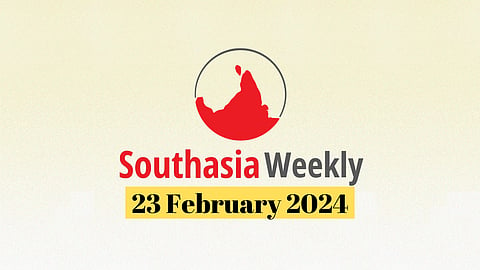Abraham Verghese, corporate funding for the BJP and more – Southasia Weekly #02
This week at Himal
Prathap Nair’s stirring essay on Abraham Verghese goes deep into the writer’s ouevre, including his acclaimed recent novel ‘The Covenant of Water’. Nair writes that while delving into modern medicine, political upheavals and more, Verghese has established himself as a different kind of diaspora writer, strikingly different from other superstars such as Salman Rushdie, Jhumpa Lahiri and Rohinton Mistry.
Megha Gupta chronicles the journey of environmental writing for children in Southasia, detailing how contemporary writing has moved beyond the moralistic animal fables of the past to draw young readers to new environmental realities.
Next weekend, we’ll be streaming the film ‘Come over for a drink, kanchhi’ as part of Screen Southasia, a series of monthly online screenings of great Southasian documentaries. Directed by Sikuma Rai, the film confronts popular narratives around alcoholism and the Rai community in Nepal. Sign up here to receive the screening links for this film and future films in the series
This week in Southasia
30 companies donated to India’s ruling BJP after government raids, new report finds
A joint investigation by NewsLaundry and The News Minute found that 30 companies had donated INR 335 crores (USD 40.3 million) to India’s ruling Bharatiya Janata Party after facing action from central government agencies between 2018 and 2023. At times, these donations were made after central government raids. In other instances, companies received licenses or clearances after making donations. As many as 23 out of the 30 companies had never donated to the BJP between 2014 and the year their offices were raided, while six of the companies faced central government action after skipping donations for one year. While the report does not conclusively prove extortion, the timing of the donations and government actions is suggestive of it.
The details on such corporate donations were made public after the country’s Supreme Court recently scrapped the electoral bonds scheme introduced by the BJP in 2018. These bonds allowed companies to anonymously donate funds to political parties via the State Bank of India. The BJP was the biggest beneficiary of the scheme, receiving nearly 55 percent of funds (amounting to over USD 7.8 billion) donated under it up to March 2023. With electoral bonds scrapped, corporate donors will face greater public scrutiny during and after India’s upcoming Lok Sabha elections. The Supreme Court has suggested that donors revert to using electoral trusts, which promise greater transparency. Regardless, the BJP will still likely receive the lion’s share of donations.
Elsewhere in Southasia 📡
The Pakistan Muslim League–Nawaz and Pakistan People’s Party announce a coalition to form the government following Pakistan’s recent election, despite accusations of widespread irregularities from the Pakistan Tehreek-e-Insaf led by Imran Khan
Sri Lanka and India continue Economic and Trade Cooperation Agreement discussions, which stalled after widespread protests in 2018
Media watchdogs call for investigation into the killing of Myanmar freelance journalist Myat Thu Tan in a military camp in Rakhine state
Chief editor of Khaama Press detained overnight in Afghanistan after critical report on the Taliban’s hijab decree
The Maldives deports Southasian migrant workers for conducting illegal business, amid its ongoing diplomatic row with India
India’s Security and Exchange Board finds INR 2000 crores (or USD 2.4 billion) diverted from the books of Zee Entertainment Enterprises, part of the Zee Media conglomerate, and top management figures are to be questioned
Afghanistan’s ruling Taliban refuses to join a UN meeting in Doha on international cooperation with the country
Farmers’ protests in India pause after a protester dies from a head injury, while the social-media platform X complies with Indian government orders to block critical reporting of the protests
21 Christians injured in the Indian state of Telangana after an attack by the Hindu nationalist Bajrang Dal and other political leaders over a road-widening dispute
Investigation reveals that Bangladesh’s former land minister, a member of the country’s ruling Awami League, owns undeclared property in the United Kingdom and United States worth GBP 200 million, leading to calls for greater scrutiny on foreign money inflows in the United Kingdom
Debtors in Nepal protest exploitative microfinance institutions, amid allegations of mismanagement and anger over government inaction despite earlier protests
Only in Southasia!
Readers of Upper Crust magazine (for the uninitiated: “India’s first and only food, wine and travel magazine”) may have been startled to find the Indian National Congress MP Shashi Tharoor described as the “Master of rizz” on its latest cover. (“Rizz”, short for charisma, was the Oxford University Press’s word of the year in 2023). Tharoor was pictured relaxing in the Maldives, on the sidelines of the local edition of the Jaipur Literature Festival – ironic, since Tharoor recently wrote an article saying the Maldives is “thumbing its nose at Indian strategic interests” and declaring, “Complacency is not an option.”
In an interview with the magazine, Tharoor answered hard-hitting questions on whether he was disillusioned with politics, why and how he is so intelligent, and whether his mother taught him to cook. We could go on, but we think it’s best you read it yourself.
From the archive
Remembering our own: ‘The Blood Telegram’ by Gary J Bass reminds us that 1971 is an evolving story (September 2015)

